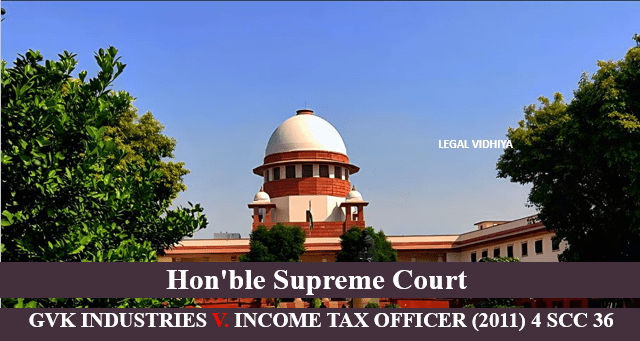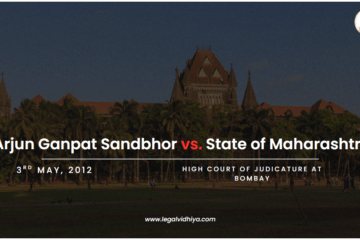
| Citation | (2011) 4 SCC 36 |
| Date of Judgment | 1st March 2011 |
| Court | Supreme Court of India |
| Case Type | Appeal (civil) 7796 of 1997 |
| Petitioner | GVK Industries Limited & Anr. |
| Respondent | Income Tax Officer & Anr. |
| Petitioner’s Advocate | GAGRAT AND CO |
| Respondent’s Advocate | SUSHMA SURI |
| Bench | S.H. KAPADIA,B. SUDERSHAN REDDY,K.S. PANICKER RADHAKRISHNAN,SURINDER SINGH NIJJAR,SWATANTER KUMAR |
| Referred | 245(1), 245(2) of the Constitution of India |
FACTS OF THE CASE
GVK industry is a conglomerate company that in order to set up a gas-related power project in Andhra Pradesh incorporated itself with a company to use their services and professionals and also to get easy loans and finances, and they entered into an agreement with ABB which is an international company in Zurich used to give professional services related to finances. After the completion of the service, the company sent an invoice for the payment to GVK, and as it was an international company the GVK company had to issue a ‘No Objection Certificate’ from the Income Tax Officer. This ‘No Objection Certificate’ has to be issued to cancel out the amount from taxes as ABB had no business in India and thus does not come under the ambit of section 9(1)(i) and also as they have not given any technical services thus, they are not included under section 9(1)(vii). However, this was rejected by the income tax officer.
The Company further applied to the commissioner of Income Tax. Initially, they granted the appeal but after six months they revoked the order and ordered to pay the amount.
The company further appealed to the High Court in the form of a writ of certiorari to quash the orders and the High Court stated that the services of ABB fall well within Section 9(1)(vii)(b) and Section 9(1)(i) did not apply but comes within the scope of 9(1)(vii) as they provided some technical services. Hence, the court rejected the appeal of giving a ‘No Objection Certificate’.
ISSUES RAISED
- Whether the Parliament has the power to enact laws for extra-territorial aspects for the territory of India or the welfare of the Indians?
- Whether the Parliament has the power to make laws for any territory?
ARGUMENTS
ARGUMENTS FOR THE APPELLANT
- The provisions mentioned are not extraterritorial.
- If someone operates extraterritorially and it is for the benefit of India then that should not be held invalid.
ARGUMENTS FOR THE RESPONDENTS
- The Attorney General argued to reconsider the decision of ECIL as this case gives a very narrow interpretation of Article 245. India has a parliamentary form of government and the executive is both accountable and answerable to the legislature. With such a narrow interpretation of Article 245, the nation will not make laws dealing with extraterritorial affairs.
- It is further stated that the Sovereign Legislature cannot make laws related to extraterritorial affairs and the domestic court cannot refuse the laws made by the sovereign legislature by stating that it has an extra-territorial effect and it would offend international law. But this does not mean that Extraterritorial laws cannot be made. Thus, it is contended that the sovereign legislature should have the power to make extra-territorial laws.
- Article 245(2) is an independent source of the power of the parliament to make extra-territorial laws.
- This brings us to the issue of ‘Nexus”. the issue of nexus and the importance of nexus arises as only the Parliament can legislate laws related to extraterritorial affairs
- They stated that Article 245(2) read with Article 245(1) of the Constitution makes it clear that the laws made within the territory of India by the Parliament may not be canceled on the ground that the law would be applied outside India.
There are several sets of cases that have been cited by the Attorney General to support the arguments but all the cases were rejected as they do not have any conformity with the issues raised.
JUDGMENT
The court observed that the problem with the ECIL judgment was the use of words such as “Provocation” and “objects” and also the narrow interpretation of Article 245 which restricts the parliament from enacting laws related to extra-territorial aspects. However, the court held that the parliament may utilize its powers to enact extraterritorial laws only when the law has an impact on the territory of India or for the welfare and interest of the Indians.
While answering the question of whether the parliament can enact laws that do not have a nexus with India even if it is having any benefit to or from India. The court replied “No” as the Parliament belongs only to India and its main responsibility is to work for India, even if the law is for the welfare of people in other territories but the primary motive has to be the benefit of India. Thus Article 245(1) does not extend to those extra-territorial aspects that do not have a nexus with India.
Moreover, any Laws that are enacted by the Parliament regarding extra-territorial aspects which have no nexus with India would be ultra vires and those laws would be considered for the foreign territory.
The court also stated that the nexus with India should be real and not illusory.
The Supreme Court also gave views on the violation of “ Territorial Sovereignty” which is protected by international laws and treaties which would be violated if the Indian parliament makes laws that have no nexus with India.
This Appeal has been listed before a bench for disposal of the case. On 18th February 2015, this was taken by U.A.Rana for the appellant and Mr. Arijit Prasad for the respondents where it was questioned whether the High Court was justified in their decision or not?
It was decided that the decision of the High Court was impregnable.
Thus, the appeal has been dismissed with no costs.
CONCLUSION
It is a very important case for the application of territorial nexus in terms of taxation. This case holds the very important aspect of the Morality of the Nation.
Written by Jayanti Roy an intern under legal vidhiya.



0 Comments